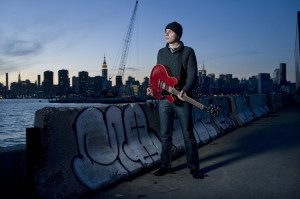Jazzing Up the City: An Inside Look into the Mind of Rafal Sarnecki
GALO: You came to New York City in 2005 on a university scholarship from The New School. Can you tell us more about this experience?
RS: My arrival at The New School was an amazing adventure for me. Suddenly I had the opportunity to meet and take lessons from musicians who were my idols for many years. It was hard for me to believe that the same person that I’d met in the elevator, in the hallway or in the cafeteria, was the same musician whose tracks I listened to frequently in an attempt to replicate their solos. Amongst the teachers that taught at the New School, there were musicians who played with Miles Davis, Charlie Parker, and John Coltran. What this means is that I was able to learn jazz from the musicians who created this style of music and were living legends. I was really impressed.
GALO: Did you experience cultural shock when you first came to The Big Apple?
RS: Indeed, I did experience a big cultural shock upon arriving in New York. The American culture seemed to be very different from any other culture that I had encountered previously. Primarily, this refers to the way that conversations are conducted [here], in addition to, facial expressions and eye contact. At times, I felt that it was easier for me to converse and communicate swiftly and effortlessly with someone from Japan, Brazil, or even a friend from the Republic of South Africa, rather than an American. These differences, however, didn’t necessarily pose an absolute obstacle in developing close friendships with Americans.
I always felt that the American people treated me with great respect. Living in New York, I never felt that I was being treated like an outsider just because I was from another country. I have great respect for the American people due to the amount of consideration they take into account when dealing with courtesy. I always felt that Americans care a lot about what they say, and how they say it, so as not to offend anyone, even in the slightest degree, during a conversation.
GALO: What fascinates you about this city? Is there anything you don’t like?
RS: As a musician, I am particularly fascinated with the New York City music scene. It is unbelievable that there are so many musicians in this city that play at the highest level. It is incredible how there are so many bands creating their own unique music; how there is such a variety of new musical currents that no one has even heard of yet in Poland. I am equally fascinated with the variety of culture – the ability to meet and work with people who were brought up in an entirely different environment than me.
The only thing that always bothered me about New York is the vast distance with which people relate to one another. Residents of the Big Apple need a lot of privacy and space (both physically and mentally). Sometimes I am under the impression that they themselves cannot cope with this gap. There are many lonely people. There are also many who are lost and unstable, murmuring to themselves in the subway or bothering passersby’s for no reason.
GALO: Who do you see yourself more as – an American or a Pole?
RS: I certainly feel more Polish than American even though the American culture had a significant impact on me. There are times, however, when I feel that I am no longer a Pole or an American definitively. While visiting Poland, there are moments when it occurs to me that people look at me strangely because I do or say something that is typical of the American culture, but in Poland it is rendered as very unusual. On the other hand, to the American people, I will always be a Pole – I speak with a distinct accent and I have the typical Slavic character and looks.
GALO: Would you ever consider moving back to Poland permanently?
RS: Yes. I plan to move back to Poland permanently in a couple of years. I believe that in Poland there is great potential to create unique musical projects and to work professionally in the jazz industry. There are many musicians playing at a very highly regarded level. They don’t sound exactly the same as those musicians who are born in the USA, but on the other hand, my music is also largely European. Therefore, in regard to that, I am not scared to return to Poland, though I will most certainly miss New York – the city that moves at an incredible pace; the city that never sleeps.
GALO: Has your Polish background helped you with your music in any way?
RS: In Poland I learned the basics of music. Presently there are numerous schools in Poland that provide one with the ability to learn the basics of jazz. However, the possibilities are quite worse when it comes to furthering one’s educational development after graduation from school. The Polish jazz scene is quite small. New York decidedly gives more possibilities in further development after college. Most importantly, playing with American musicians one can learn certain unique characteristics only present in jazz, as well as a sense of rhythm and articulation. In Poland it is much harder to learn these elements.
(Article continued on next page)

